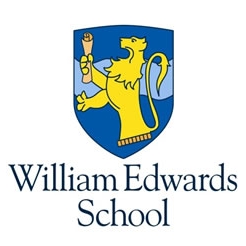
Organisation: William Edwards School
Intervention: Catch Up® Literacy
Submitted by: Amanda Wood
Background
William Edwards School is an 11-16 converter academy which has recently formed a MAT partnership with 2 local primary schools. Pupils entering the school arrive with APS below average, and a range of support systems have been developed to accelerate their progress upon transition. Over the last 2 years, the number of pupils with SEN status has risen and we have seen pupils entering the school with more complex needs.
We chose the Catch Up® intervention as a key support mechanism because of its structure and the staffing model we have developed. We had two Progress leaders with expertise in literacy and dyslexia (one with a degree and the other a diploma) and wanted to adopt a programme that could reach a number of pupils. The short sessions, repeated throughout the week, fitted in with our support model, and the results from other schools were clearly good. We had also adopted the Accelerated Reader Programme and the two programmes seemed to complement each other, with one providing the pupils with very close support and the other building independence.
Implementation
Timetabling – whilst we do run some before and after school sessions, we noticed very quickly that this did not meet the needs of some pupils, especially those categorised as Pupil Premium. We have, therefore, developed a programme that provides a significant amount of the Catch Up® intervention within the curriculum. Some pupils receive the intervention twice weekly (as recommended by Catch Up®), but others – with Specific Learning Difficulties – receive it every day.
Learners are selected from a range of data on entry (APS, NC levels, CATS, Lucid Screening, Accelerated Reader, NGRT testing), but also throughout the academic year if they are deemed to be making less than acceptable progress due to literacy weaknesses.
Learners are monitored through Catch Up® data, Accelerated Reader data, and termly testing which then feeds into termly review. Information about the progress of pupils on the programme is collated termly and disseminated to staff through SEND updates and Support Plan updates.
The Progress Leaders who deliver the intervention have developed through external training at degree/diploma level over the last 3 years, and also through targeted CPD from UEL, Dyslexia Action and Nasen. They work alongside teachers and the SENCo, and have also been instrumental in developing teacher knowledge of the intervention and the skills associated with it. They are now working with our MAT partners to raise awareness of the intervention in primary, and encourage attendance on Catch Up® training so it can be introduced into those schools.
Case Study 1 - Catch Up® Literacy
When Child A started Catch Up® Literacy, he had no confidence to read out loud in a class environment, and was reluctant to focus on any reading tasks. After standardised testing, he began the Catch Up® intervention with a reading age of 7 years and 3 months, which was significantly lower than his chronological age of 11 years and 3 months. After 7 months, Child A had made significant progress, not only with his ratio gain but also with his confidence to read in class, often raising his hand and asking to read to others.
Child A finished with a reading age of 10 years and 2 months – a ratio gain of 5!
Aims
As a school community we constantly strive to raise standards in both academic
attainment and social skills and awareness, to ensure that our students have the very best platform from which to succeed to the very best of their ability.
We expect and ensure the highest standards of behaviour and attitudes to learning, we support each and every child to achieve their very best, we regularly celebrate and reward students’ achievements and hard work.
We are committed to the strong sporting ethos and values we wish to instil in our students: we encourage and develop honesty, ambition, leadership, team work, integrity, respect and resilience.